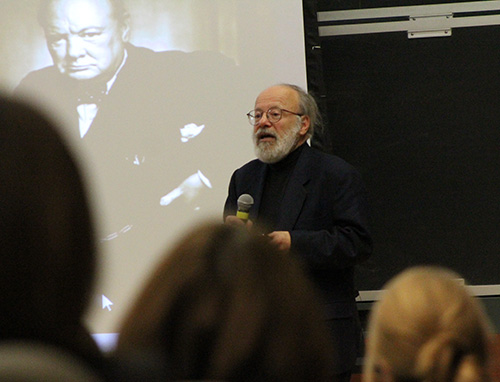SPH Health Law Experts Condemn Physician Participation in CIA Interrogations.
A new poll from the Pew Research Center shows that most Americans believe the CIA’s harsh interrogation methods were justified and helped to prevent terrorist attacks.
But regardless of the public response, a trio of School of Public Health professors says there is no justification for the complicity of medical doctors and psychologists in abusive interrogations.

At a December 16 forum organized by the Department of Health Law, Bioethics & Human Rights, Sondra Crosby and Michael Grodin and department chair George Annas said the participation by medical professionals in torturing prisoners warrants a strong response by medical groups and leaders.
“The culture of abuse is validated when doctors, physicians and other health professionals participate in it,” said Crosby, an associate professor of health law and medicine. “I think this has caused immeasurable damage to our profession.”
Crosby said claims by some former Bush administration and CIA officials that one interrogation tactic – “rectal feeding” – was done for medical reasons are deceptive. She said the Senate Intelligence Committee report on the CIA’s activities, released this month, contains many examples in which abusive tactics are “medicalized . . . to get people to buy into them.”
She noted that the United Nations Convention against Torture deems as “torture” any act in which severe pain, physical or mental, is intentionally inflicted on a person for purposes such as obtaining information or a confession.
The Senate report concluded that the techniques used – which Crosby called “chilling” – were not an effective way to gain intelligence from detainees, and that the CIA misled Congress and the White House.
Grodin said two contracted psychologists referenced in the report, who were hired for millions of dollars to devise the interrogation program, had “no background in interrogation.” In addition, he said, the CIA had determined in 1989 that “inhumane” physical and psychological techniques did not work to produce intelligence information.
Grodin offered some possible explanations for why physicians might participate in abusive tactics – including what he called an ability to “compartmentalize” and a “fantasy of power.” But he added that there were no “absolute predictors” of why someone might become complicit in inhumane treatment.
Annas said that after the September 11 attacks, the CIA ignored the human rights protections in the Geneva Conventions by claiming its tactics were needed to prevent another attack.
“’Saving lives’ is a good excuse,” he said, describing how the agency’s defenders attempted to justify its actions. “’Saving American lives’ is better, and ‘saving innocent American lives’ is even better.”
To the question, “Who was responsible?” Annas said, “It was the lawyers and doctors working together. That is a powerful combination.”
Annas said that while President Obama “doesn’t seem to want to do anything about this,” various medical groups have denounced the participation of physicians in torture.
The American Medical Association said in a statement, “The participation of physicians in torture and coercive interrogation is a violation of core ethical values.” Physicians for Human Rights called for health professionals to be held accountable for complicity in the program.
In the report, names of all CIA medical personnel are blacked out. Annas told the Washington Post this week, “The medical community can do damn little except say this is a bad thing to do, because you don’t know who these people are.”
Submitted by: Lisa Chedekel
Chedekel@bu.edu